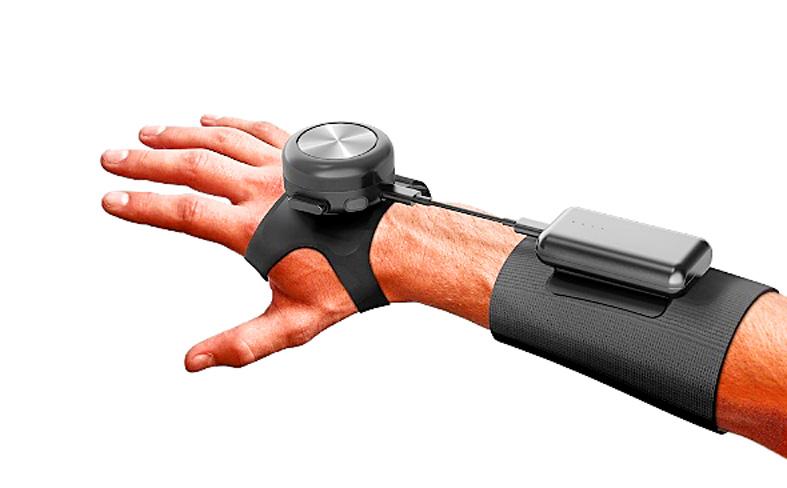Hon Hai Precision Industry Co (鴻海精密) yesterday announced a strategic partnership with British medical device start-up GyroGear Co, as the world’s largest contract electronics maker aims to manufacture GyroGear’s flagship product, the GyroGlove.
Hon Hai would invest £1 million (US$1.38 million) in GyroGear to acquire one seat on the firm’s board of directors, the world’s largest contract electronics maker said.
The GyroGlove is the first wearable medical device developed for people with hand tremors, such as those with Parkinson’s disease or essential tremor disorder, Hon Hai said in a statement.

Photo courtesy of Hon Hai Precision Industry Co
More than 200 million people worldwide frequently experience hand tremors, and more than half of them live in Asia, the company said.
According to the British firm’s Web site, GyroGear founder Faii Ong developed the idea of the GyroGlove as a medical student when he noticed that older people with hand tremors had problems eating, and their health deteriorated due to malnutrition.
“It functions exactly like a top,” Ong said in an interview with Channels Television, describing the gyroscope positioned in the GyroGlove. “Just as the top spins, it tries to stay upright. In the same way, the glove counteracts your hand tremors.”
A Channels Television video showed a patient with essential tremors paint her nails with the aid of the wearable device, even though the GyroGlove, according to the company, is still in development and not yet market-ready.
“We believe that our collaboration with Hon Hai will help tremor patients in Asia,” Ong said.
Hon Hai said that the partnership would strengthen its presence in the medical-device industry.
It would also help Hon Hai “align with our core mission of making people’s lives better through the power of technology,” the company said.
Hon Hai added that it would obtain exclusive rights to produce and sell the wearable glove in Asia.
The two firms are also collaborating to establish a research-and-development facility in Taiwan focused on software and hardware, Hon Hai said.
The investment is part of Hon Hai’s bid to explore sources of growth and expand from manufacturing to hardware and software integration.

Nvidia Corp chief executive officer Jensen Huang (黃仁勳) on Monday introduced the company’s latest supercomputer platform, featuring six new chips made by Taiwan Semiconductor Manufacturing Co (TSMC, 台積電), saying that it is now “in full production.” “If Vera Rubin is going to be in time for this year, it must be in production by now, and so, today I can tell you that Vera Rubin is in full production,” Huang said during his keynote speech at CES in Las Vegas. The rollout of six concurrent chips for Vera Rubin — the company’s next-generation artificial intelligence (AI) computing platform — marks a strategic

Enhanced tax credits that have helped reduce the cost of health insurance for the vast majority of US Affordable Care Act enrollees expired on Jan.1, cementing higher health costs for millions of Americans at the start of the new year. Democrats forced a 43-day US government shutdown over the issue. Moderate Republicans called for a solution to save their political aspirations this year. US President Donald Trump floated a way out, only to back off after conservative backlash. In the end, no one’s efforts were enough to save the subsidies before their expiration date. A US House of Representatives vote

REVENUE PERFORMANCE: Cloud and network products, and electronic components saw strong increases, while smart consumer electronics and computing products fell Hon Hai Precision Industry Co (鴻海精密) yesterday posted 26.51 percent quarterly growth in revenue for last quarter to NT$2.6 trillion (US$82.44 billion), the strongest on record for the period and above expectations, but the company forecast a slight revenue dip this quarter due to seasonal factors. On an annual basis, revenue last quarter grew 22.07 percent, the company said. Analysts on average estimated about NT$2.4 trillion increase. Hon Hai, which assembles servers for Nvidia Corp and iPhones for Apple Inc, is expanding its capacity in the US, adding artificial intelligence (AI) server production in Wisconsin and Texas, where it operates established campuses. This

US President Donald Trump on Friday blocked US photonics firm HieFo Corp’s US$3 million acquisition of assets in New Jersey-based aerospace and defense specialist Emcore Corp, citing national security and China-related concerns. In an order released by the White House, Trump said HieFo was “controlled by a citizen of the People’s Republic of China” and that its 2024 acquisition of Emcore’s businesses led the US president to believe that it might “take action that threatens to impair the national security of the United States.” The order did not name the person or detail Trump’s concerns. “The Transaction is hereby prohibited,”